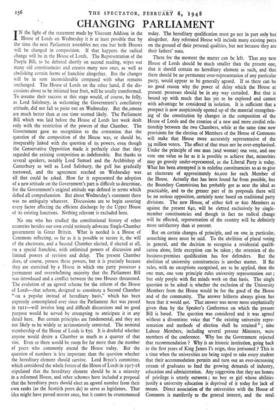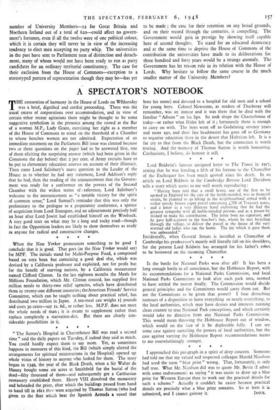CHANGING PARLIAMENT
IN the light of the statement made by Viscount Addison in the House of Lords on Wednesday it is at least possible that by the time the next Parliament assembles not one but both Houses will be changed in composition. If that happens the radical change will be in the House of Lords. The Representation of the People Bill, to be debated shortly on second reading, wipes out many old constituencies and creates-many new ones, as well as abolishing certain forms of franchise altogether. But the changes will be in sum inconsiderable compared with what remains unchanged. The House of Lords on the other hand, if the dis- cussions about to be initiated bear fruit, will be totally transformed. To assume their success at this stage would, of course, be folly, as Lord Salisbury, in welcoming the Government's conciliatory attitude, did not fail to point out on Wednesday. But the omens are much better than at one time seemed likely. The Parliament Bill which was laid before the House of Lords last week dealt only with the restriction of the powers of that Chamber. The Government gave no recognition to the contention that the question of the composition of the House was, or should be, inseparably linked with the question of its powers, even though the Conservative Opposition made it perfectly clear that they regarded the existing composition as indefensible. But thanks to several speakers, notably Lord Samuel and the Archbishop of Canterbury as well as Lord Salisbury, the gulf has gradually narrowed, and the agreement reached on Wednesday was all that could be asked. How far it represented the adoption of a new attitude on the Government's part is difficult to determine, for the Government's original attitude was defined in terms which defied all comprehension. But about Wednesday's statement there was no ambiguity whatever. Discussions are to begin covering every factor affecting the efficient discharge by the Upper House of its existing functions. Nothing relevant is excluded here.
No one who has studied the constitutional history of other countries besides our own could seriously advocate Single-Chamber government in Great Britain. What is needed is a House of Commons reflecting, so far as it is possible to secure it, the will of the electorate, and a Second Chamber elected, if elected at all, cn a special franchise, with unlimited powers of discussion and limited powers of revision and delay. The present Chamber does, of course, possess those powers, but it is precisely because they are exercised by a House in which one party possesses a permanent and overwhelming majority that the Parliament Bill was introduced and a conflict between the two Houses threatened. The evolution of an agreed scheme for the reform of the House of Lords—that reform, designed to constitute a Second Chamber " on a popular instead of hereditary basis," which has been expressly contemplated ever since the Parliament Act was passed in 191i—will involve long and difficult discussions and no good purpose would be served by attempting to anticipate it in any detail here. But certain principles are fundamental, and they are not likely to be widely or acrimoniously contested. The nominal membership of the House of Lords is 85o. It is doubtful whether anyone would desire a Chamber as much as a quarter of that size. Even so there would be room for far more than the number of peers who commonly attend the House today. But the question of numbers is less important than the question whether the hereditary element should survive. Lord Bryce's committee, which considered the whole future of the House of Lords in 1917-18 stipulated that the hereditary element should be in a minority in a reformed House, and other schemes have included a proposal that the hereditary peers should elect an agreed number from their own ranks (as the Scottish peers do) to serve as legislators. That idea might have passed muster once, but it cannot be countenanced today. The hereditary qualification must go not in part only but altogether. Any reformed House will include many existing peers on the ground of their personal qualities, but not because they are their fathers' sons.
There for the moment the matter can be left. That any new House of Lords should be much smaller than the present one, that it should contain no hereditary element as such, and that there should be no permanent over-representation of any particular party, would appear to be generally agreed. If so there can be no good reason why the power of delay which the House at present possesses should be in any way curtailed. But that is bound up with much that has yet to be explored and cannot with advantage be considered in isolation. It is sufficient that a prospect is now auspiciously opened up of the material strengthen- ing of the constitution by changes in the composition of the House of Lords and the creation of a new and more cordial rela- tionship between the two Chambers, while at the same time new provisions for the election of Members of the House of Commons will make that House more accurately representative of the 34 million voters. The effect of that must not be over-emphasised. Under the principle of one man (and woman) one vote, and one vote one value so far as it is possible to achieve that, minorities may go grossly under-represented, as the Liberal Party is today. What has been attempted is to redefine constituencies so as to give an electorate of approximately 6o,00o for each Member of the House. Actually that has been found far from possible, but the Boundary Commission has probably got as near the ideal as practicable, and to the greater part of its proposals there will be no serious opposition, certainly none based on traditional party divisions. The new House, of either 608 or 62o Members as against the present 64o, will be elected exclusively by single- member constituencies and though in fact no radical change will be effected, representation of the country will be definitely more satisfactory than at present.
But on certain changes of principle, and on one in particular, something more must be said. To the abolition of plural voting in general, and the decision to recognise a residential qualifi- cation alone, little exception can be taken ; the retention of the business-premises qualification has few defenders. But the abolition of university constituencies is another matter. If flat rules, with no exceptions recognised, are to be applied, then the one man, one vote principle rules university representation out ; but only people with flat minds work on that basis. The single question to be asked is whether the exclusion of the University Members from the Hotise would be for the good of the House and of the community. The answer hitherto always given has been that it would not. That answer was never more emphatically given than by the Speaker's Conference on which the present Bill is based. The question was considered and it was agreed without a dissentient voice that " the existing university repre- sentation and methods of election shall be retained " ; nine Labour Members, including several present Ministers, were members of the conference. Why has the Government rejected that recommendation ? Why is an historic institution, going back to the first years of King James I's reign, thus jettisoned ? This is a time when the universities are being urged to take every student that their accommodation permits and turn out an ever-increasing stream of graduates to feed the growing demands of industry, education and administration. Any suggestion that they are homes of privilege is utterly outworn ; no boy or girl whose abilities justify a university education is deprived of it today for lack of means. Direct association of the universities with the House of Commons is manifestly to the general interest, and the total. number of University Members-12 for Great Britain and Northern Ireland out of a total of 62o—could affect no govern- ment's fortunes, even if-all the twelve were of one political colour, which it is certain they will never be in view of the increasing tendency to elect men accepting no party whip. The universities in the past have sent to Parliament men of distinction and detach- ment, many of whom would not have been ready to run as party candidates for an ordinary territorial constituency. The case for their exclusion from the House of Commons—exception to a stereotyped pattern of representation though they may be—has yet to be made ; the case for their retention on any broad grounds, and on their record through the centuries, is compelling. The Government would gain in prestige by showing itself capable here of second thoughts. To stand for an educated democracy and at the same time to deprive the House of Commons of the contribution the universities have made to its deliberations for three hundred and forty years would be a strange anomaly. The Government has let reason rule in its relation with the House of Lords. Why hesitate to follow the same course in the much smaller matter of the University Members?































 Previous page
Previous page